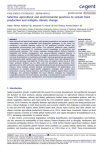Halshoy H.S., Hama J.R, Braim S.A. (2025). Selective agricultural and environmental practices to sustain food production and mitigate climate change. Cogent Food & Agriculture, 01/01/2025, vol. 11, n. 1, p. 2562179.
https://doi.org/10.1080/23311932.2025.2562179
https://doi.org/10.1080/23311932.2025.2562179
| Titre : | Selective agricultural and environmental practices to sustain food production and mitigate climate change (2025) |
| Auteurs : | H.S. Halshoy ; J.R Hama ; S.A. Braim |
| Type de document : | Article |
| Dans : | Cogent Food & Agriculture (vol. 11, n. 1, 2025) |
| Article en page(s) : | p. 2562179 |
| Langues : | Anglais |
| Langues du résumé : | Anglais |
| Catégories : |
Catégories principales 06 - AGRICULTURE. FORÊTS. PÊCHES ; 6.4 - Production Agricole. Système de ProductionThésaurus IAMM PRATIQUE AGRICOLE ; DURABILITE ; PRODUCTION ALIMENTAIRE ; SECURITE ALIMENTAIRE ; CHANGEMENT CLIMATIQUE ; ZONE SEMI ARIDE ; ZONE ARIDE ; ADAPTATION AU CHANGEMENT |
| Résumé : | Semi-arid and arid agricultural regions with growing populations and extreme weather vulnerability face major sustainable food production challenges. In this study, we conducted a narrative literature review of 163 published scientific articles and documented environmental case studies. The collected references were carefully analyzed and summarized to synthesize current knowledge on agricultural and environmental practices. This review evaluates climate-resilient farming methods, integrated soil fertility management, and resource-efficient irrigation systems. It combines evidence on the effectiveness of organic amendments, conservation tillage, and crop diversification in maintaining soil health, reducing greenhouse gas emissions, and improving yield stability under climate stress. Results show that adopting these practices can increase crop yields by 15-35%, raise soil organic carbon by up to 25%, lower synthetic fertilizer use by 40%, and cut greenhouse gas emissions from agriculture by 10-20%, while also supporting biodiversity and decreasing environmental impacts. These findings provide practical recommendations for policymakers and practitioners to develop region-specific adaptation strategies that protect food production, conserve natural resources, and enhance resilience against future climate challenges. Our synthesis highlights the most effective strategies for integrating sustainable practices into food systems, providing a comprehensive overview that can guide future research, policy development, and practical implementation. |
| Cote : | En ligne |
| URL / DOI : | https://doi.org/10.1080/23311932.2025.2562179 |







